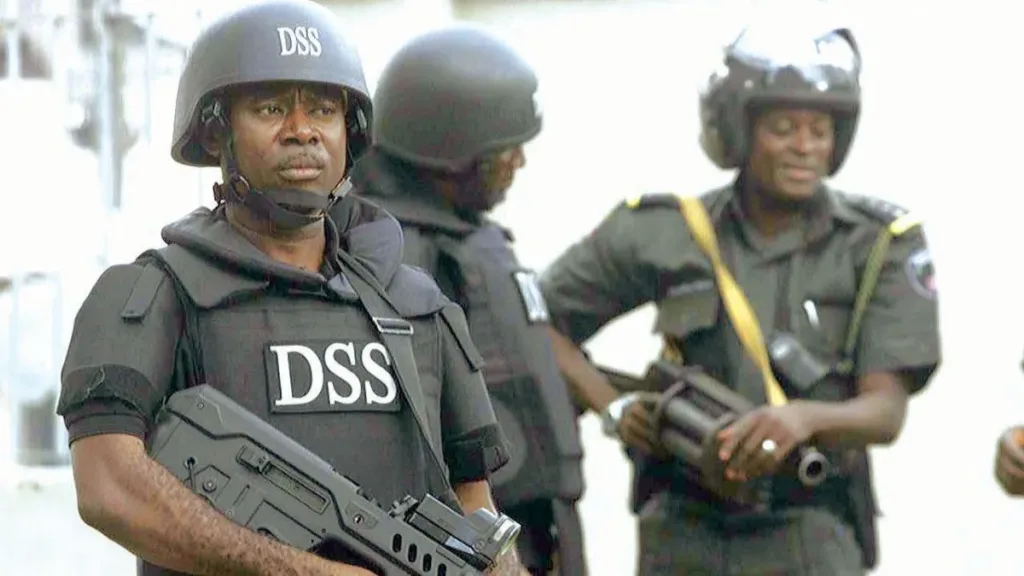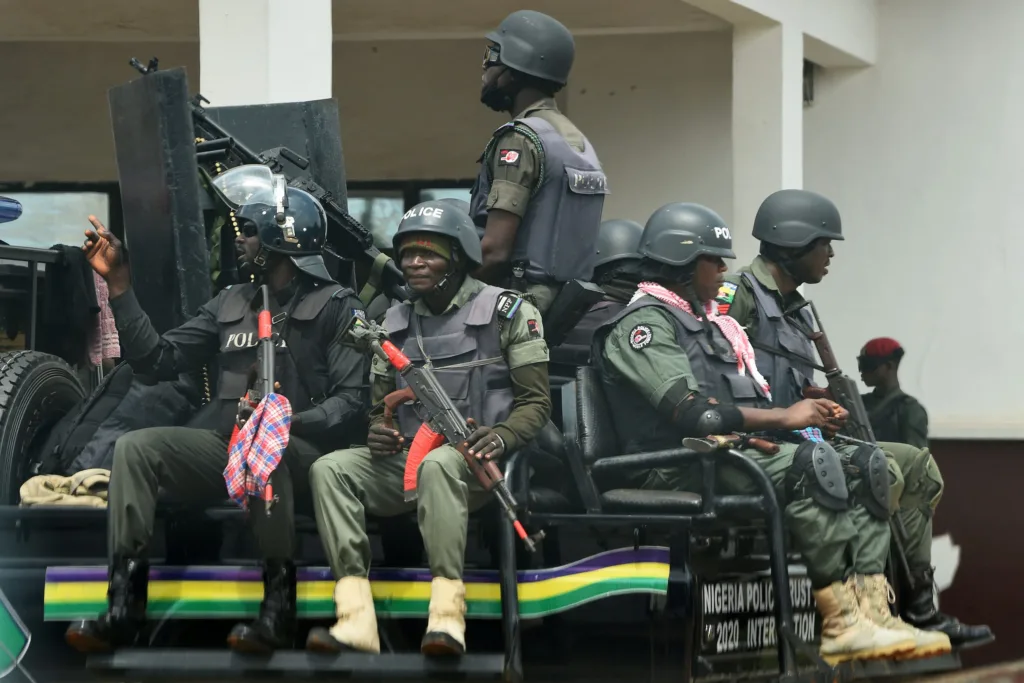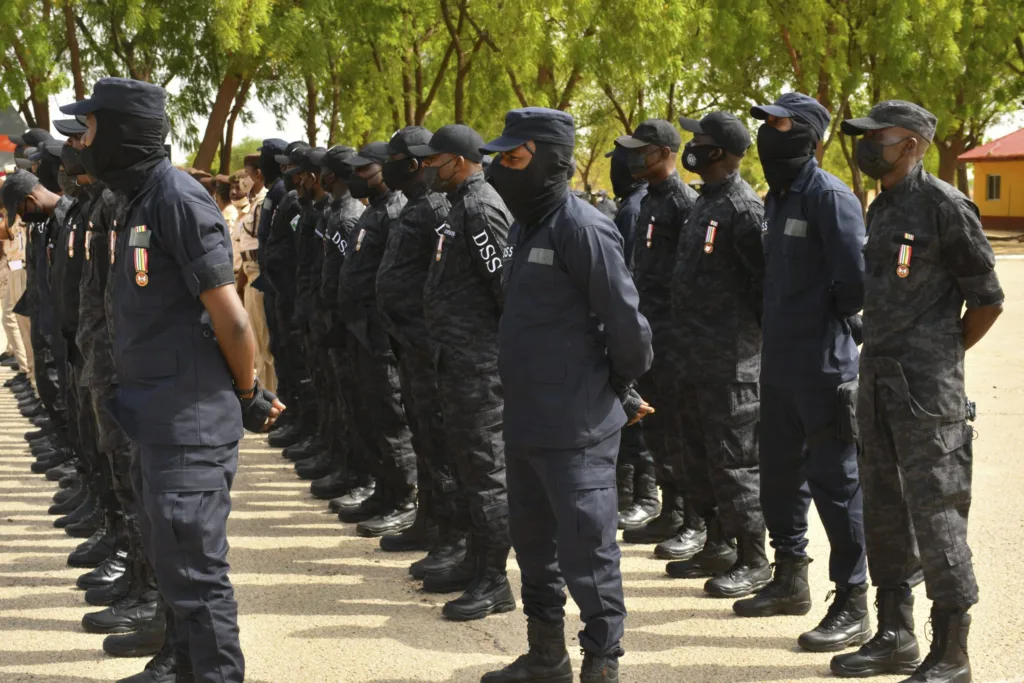The DSS and The Nigerian Police: Who is More Powerful?
A lot of people have been asking the question of, ‘which is more powerful in Nigeria – the Police or the Department of State Services (DSS)?’ Though this might seem a simple question, it’s better to get into details before answering the question.

An image showing both Nigerian police and DSS
The Police has many officers who catch criminals and keep order everywhere in the country. The DSS is a secret intelligence agency that works behind the scenes on big national threats.
This article looks at both to know if the Police is stronger because it protects all communities. Or is the DSS stronger because it handles serious security problems without anyone seeing?
THE DSS AND THE NIGERIAN POLICE: WHO IS MORE POWERFUL?
The Department of State Services (DSS) and the Nigerian Police Force are two of the most powerful security agencies in Nigeria. They both play critical roles in maintaining law and order, but there are debates around which organization is more powerful.
The following paragraphs of this article analyzes the roles, responsibilities, powers, and capacity of both agencies to determine which wields more influence.
AN OVERVIEW OF THE NIGERIAN POLICE FORCE
The Nigerian Police Force is the principal law enforcement agency in Nigeria. It is responsible for preventing and detecting crime, protecting life and property, and maintaining public safety and order.

POWERS AND CAPABILITIES
- The Police have wide jurisdictional powers across all of Nigeria’s 36 states. They can investigate crimes, arrest suspects, and prosecute offenders.
- With about 370,000 officers, the Nigerian Police has manpower across local, state, and federal units. This allows them to respond to security threats across the country.
- Police officers are armed, uniformed, and have the power to use force as appropriate while discharging their duties.
- The Police have special units like the Special Anti-Robbery Squad (SARS), intelligence, and tactical teams that enhance effectiveness.
- The Inspector General of Police has extensive discretion over deploying resources to address major crimes and public order situations.
However, the Nigerian Police force has shortcomings like underfunding, limited training, outdated infrastructure, and problems with accountability and human rights records. These constrain police efficacy and public trust in many areas.
ALSO READ: NIGERIAN ARMY VS DSS: WHO IS MORE POWERFUL?
ABOUT THE DEPARTMENT OF STATE SERVICES (DSS)
The DSS or SSS is Nigeria’s federal security agency focused on intelligence gathering and protecting national security interests.

POWERS AND CAPABILITIES
- The SSS has a broad mandate that includes intelligence operations, counterterrorism, anti-corruption investigations, border protection, cybersecurity, and protecting senior government officials.
- Although focused on Abuja and national threats, SSS can intervene across all states if a security issue has implications for national stability.
- SSS officers have powers of investigation and arrest like the police but are also authorized to detain suspects longer for interrogation.
- The agency has well-trained intelligence officers, sophisticated surveillance infrastructure, cyber units, databases, and weapons for specialized operations.
- As Nigeria’s spy agency, the SSS has extensive discretion on methods for covert evidence gathering. This makes them hugely influential behind the scenes.
However, SSS operations are mostly covert without independent oversight or accountability to the public. There are criticisms about human rights violations in detention and excessive political interference.
COMPARATIVE ANALYSIS OF POWER AND INFLUENCE: THE DSS AND THE NIGERIAN POLICE
The Nigerian police and Department of State Security (DSS) have distinct but overlapping roles in law enforcement.
The police have greater visibility with expansive grassroots presence across all states. But the SSS has more covert influence over national security issues and elite politics.
Ultimately, both organizations wield tremendous authority with average citizens having regular contact with the police while the SSS operates more discreetly in shaping high-level cases.
The police exert more physical force for basic law and order. But the SSS influences critical cases linked to political stability, terrorism, corruption and international diplomacy behind closed doors.
So the question of who is more powerful depends on whether metrics used are based on street-level law enforcement or covert capabilities to advance national interests unconstrained by public accountability.
ALSO READ: NIGERIAN ARMY & NIGERIAN POLICE: WHO IS MORE POWERFUL?
The Nigerian Police possibly interacts with and arrests more citizens at an individual level. But Nigeria’s fate as a nation often lies disproportionately on decisions and actions taken by the DSS.
In summary, this analysis shows the Nigerian Police Force and the DSS both wield substantial influence in complementary ways.
The Police is more visibly powerful in the everyday maintenance of law and order across communities. But the DSS has more discretionary covert authority over high-stakes cases involving national leadership and strategic priorities.
Overall, the DSS probably shapes more critical outcomes for the nation owing to intelligence capacities even if it lacks grassroots reach. The Police however cannot be discounted given its vast presence and ultimate responsibility for public safety countrywide.
FREQUENTLY ASKED QUESTIONS
Are you still not clear yet? Here are some answers to frequently asked questions (FAQs) on the issue of who is more powerful between the DSS and The Nigerian Police.
- What powers does the Nigerian Police have?
The Nigerian Police have wide jurisdictional powers across all states to investigate crimes, make arrests, detain suspects, interrogate offenders, and prosecute them in court. Police officers can use force as appropriate to enforce law and order.
- What are the strengths of the Nigerian Police Force?
The Police have over 300,000 officers, making them manpower-intensive for responding across Nigeria. They have special units like SARS, intelligence, tactical and traffic teams.
- How much authority does the DSS have?
The State Security Services can intervene in any state if a security issue poses grave national-level danger. SSS officers have investigative and arrest authority but can also detain indefinitely.
- Which is more powerful – the Nigerian Police or DSS?
The Nigerian Police exerts more power regarding routine law enforcement across communities nationally with its wide reach and numbers.
However, it’s hard to determine conclusively.
The Police has more visibility and grassroots presence across communities. But the DSS has covert influence over cases involving politics, national security and stability which are deemed more critical ultimately.
CONCLUSION
In summary, the Nigerian Police and the DSS both have great power.
The Police is in charge of daily law and order across the whole country. People see them taking action on common crimes all the time.
But the DSS secretly controls cases about politics, terrorism and other big problems that can destabilize the nation.
One controls streets with many officers while one controls secrets with spy skills. Both have major force, one openly maintaining safety and one privately protecting stability in hidden ways.
For ordinary Nigerians, the local Police matters more in their daily lives. But for handling crises that can make or break Nigeria, the DSS seems to have bigger control behind curtains.
Both have mighty authority, one visible everywhere, one invisible but strongly shaping outcomes secretly.
Nigeria needs both agencies properly for security, even if by their nature, they wield power and influence quite differently.

